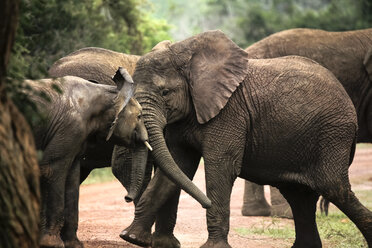Kigezi Wildlife Reserve, a significant conservation area located in Rukungiri district, South Western Uganda, is known for being a sanctuary for migrating elephants from the Rwindi Plains in the Democratic Republic of Congo (DRC) and Queen Elizabeth National Park during the rainy season.
Located in a hilly area often referred to as the Switzerland of Africa, the Wild Life Reserve is characterized by its cool climate and stunning landscape.
Counted among the 11 wildlife reserves in Uganda, including Ajai, Bokora, Bugungu, East Madi, Karuma, Kabwoya, Kayanja, Kyambura, Matheniko, Toro-Semiliki, and the Pian-upe, the Kigezi Wildlife Reserve stands out for its unique geographical features, significant elephant populations, and its role as a migration corridor.
According to the Uganda Wild Life Authority (UWA), the reserve acts as a buffer zone between Queen Elizabeth National Park and surrounding populated areas, enhancing wildlife protection.
Established in 1952, the reserve covers approximately 278 square kilometers, proving a diverse habitat for various inhabitants.
The reserve hosts several other species, including buffaloes and various antelope species, lions, leopards, warthogs, and Uganda kobs, among many others.
Primates like the Eastern and White Colobus, Red Colobus, and Chimpazees are also available at the game reserve.
While on a Uganda Safari Tour, tourists at the game reserve can also get involved in a number of activities, like forest walks with well-trained tour guides and colobus monkey tracking, which begins in the morning with a briefing at the reserve headquarters led by the ranger guides who prepare the tourists for the dos and don’ts of the trekking.
Kigezi Wildlife Reserve, however, faces a number of challenges in terms of tourism infrastructure in order to enhance the overall experience of the tourist.
Alphose Baryomumisho, a tourist guide at the reserve, said that lack of lodging within the reserve boundaries discourages potential tourists looking for convenience and accessibility.
Baryomumisho also complained of impassable roads in the reserve.
“The roads leading to this reserve are in very poor condition; during the rainy season, the roads are impassable,“ Baryomumisho said.
Pontious Ezuma, the Chief Warden at the reserve, also expressed concern about the lack of enough marketing to promote Kigezi Wildlife Reserve as a tourist destination.
“When we compare to our neighbors in Kenya and Tanzania, Uganda’s tourism marketing is really less aggressive, leading to lower visualization of reserves like Kigezi,” Ezuma stated.
Other challenges the reserve is facing range from stiff competition with well-known wildlife conservation areas that offer better infrastructure and established tourism services to encroachments by the local community for agriculture and poaching activities.















